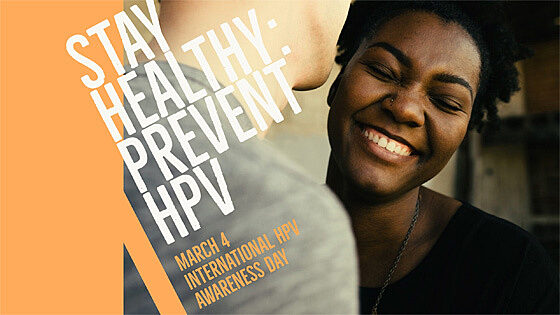Prevent and Protect Yourself from HPV

This year, the University of Florida Health Cancer Center is recognizing March 4, International HPV Awareness Day, by equipping you with the information you need to protect yourself from this infection, which causes 30,700 cases of cancer in the U.S. each year.
What is HPV?
Human papillomaviruses, or HPVs, are a group of more than 200 related viruses that are spread through sexual contact. Most types are not harmful. According to the Centers for Disease Control and Prevention, nearly every sexually active person will develop some form of HPV in their lifetime — but in nine out of 10 of those cases, the virus will not show any symptoms and will go away within two years. There are times, however, when certain types of the HPV virus can progress to cancer.
Infections caused by HPV:
- Cervical cancer: Almost all cases of cervical cancer are caused by HPV.
- Cancer of the anus: About 95 percent of anal cancers are caused by HPV.
- Cancers of the mouth, tongue and throat: About 70 percent of oropharyngeal cancers are caused by HPV.
- Vaginal and vulvar cancer: About 65 percent of vaginal cancers and 50 percent of vulvar cancer are caused by HPV.
- Cancer of the penis: About 35 percent of penile cancers are caused by HPV.
- Genital warts: About 90 percent of genital warts are caused by HPV.
- Warts in the throat: Two types of HPV can cause benign tumors to grow in the air passages leading from the nose and mouth into the lungs.
HPV also causes the most common cancer, oropharyngeal squamous cell carcinoma. This head and neck cancer has increased by 300 percent in the past 20 years, according to a recent study by Ashish Deshmukh, Ph.D., MPH, an assistant professor in the department of health services research, management and policy at the University of Florida.
Fortunately, there is an effective vaccine against HPV; unfortunately, however, recent data shows that only 57 percent of girls and 35 percent of boys have received the vaccine, according to the CDC.
In the past, HPV was considered particularly threatening to women. However, one of the most high-risk strains of HPV, HPV 16, is seven times more common among men than women, Deshmukh said in a recent interview with CBS. Researchers also found that one in nine men in the U.S., or 12 percent, have an oral infection of the virus, compared to only 3 percent of women.
Researchers are unsure why the oral HPV rate is so much higher in men than in women, but there are ways to protect yourself and your loved ones from the virus and prevent its spread.
How do you protect yourself and your loved ones from HPV?
Vaccines
According to the CDC, vaccines are very effective and can prevent most of the cancers caused by HPV.
Experts say boys and girls between the ages of 11 and 12 should receive both doses of the vaccine six to 12 months apart. If they received their two shots less than five months apart, they will need a third dose of the vaccine. If your child is over 14 years old, he or she should receive three shots over six months.
If your teenager has not gotten the vaccine, you should consult a doctor or nurse about getting it as quickly as possible. In addition, if your teen did not finish the vaccine series, he or she should complete it now.
The HPV vaccine is recommended for men who are aged 21 years and younger. If they have sex with other men, it is recommended they receive the vaccine through age 26. This also applies to transgender young adults. Women should receive the vaccine through age 26.
These ages are recommended for maximum vaccine effectiveness. According to the CDC, clinical trials indicate that after these ages, the vaccine provided little to no protection to HPV-related diseases. If you are over these ages and want to receive the vaccine, it is possible, but it may not be covered by your insurance provider.
Screening
Another way to protect yourself from the harmful effects of HPV and cervical cancer is to screen regularly — which means to check for HPV or HPV-related diseases before there are any symptoms. Beginning at age 21, women should receive a Pap test every three years. This can help diagnose cervical cancer early. Women can also pair it with an HPV test, which can find any of the high-risk types of HPV that are commonly found in cervical cancer.
Currently, there is no approved test for HPV in men and screening is not recommended by the CDC for anal, penile or throat cancers. However, men who may be at increased risk for anal cancer, including men with HIV or men who receive anal sex, may be eligible for an anal Pap test and should ask their health care provider. Lastly, see a health care provider if you have any new or unusual growths, lumps or sores on your penis, scrotum, anus, mouth or throat.
For more information on how to protect yourself from HPV, talk to your health care provider or visit our HPV Vaccine health topic page.
Learn more
- Human papillomavirus (HPV) and cervical cancer - World Health Organization
- Time Magazine - 1 in 9 Men Have Oral HPV